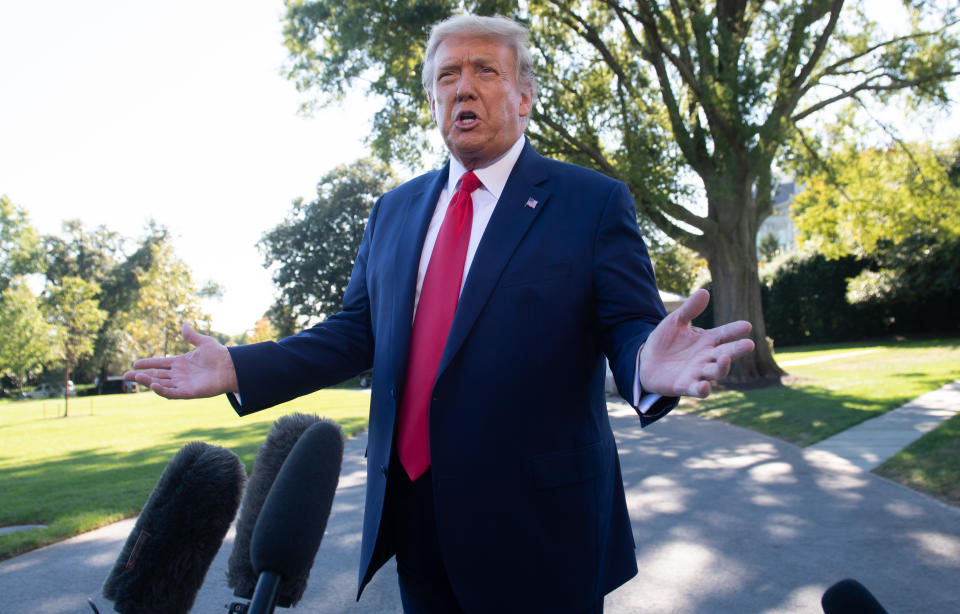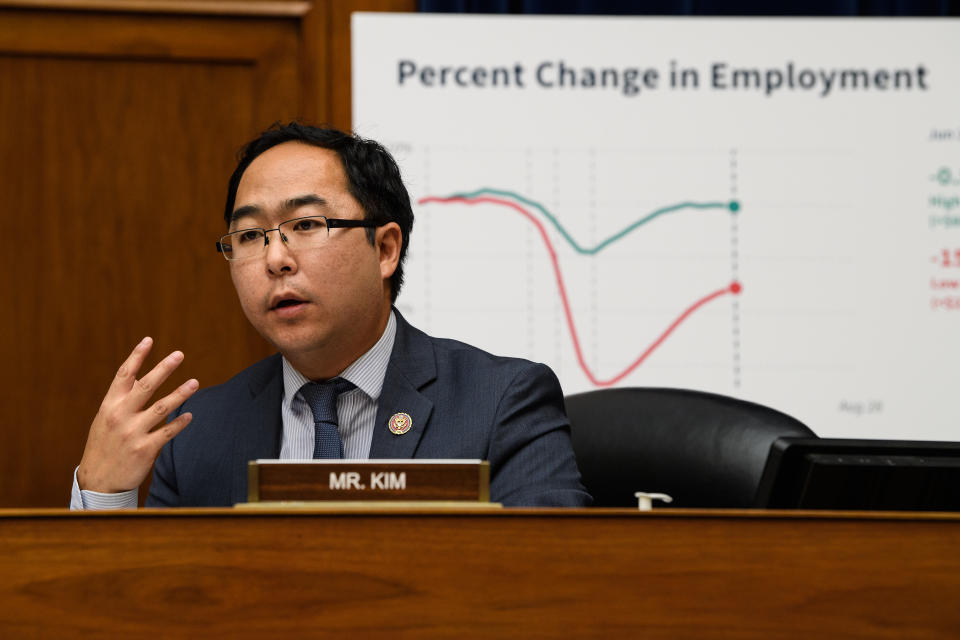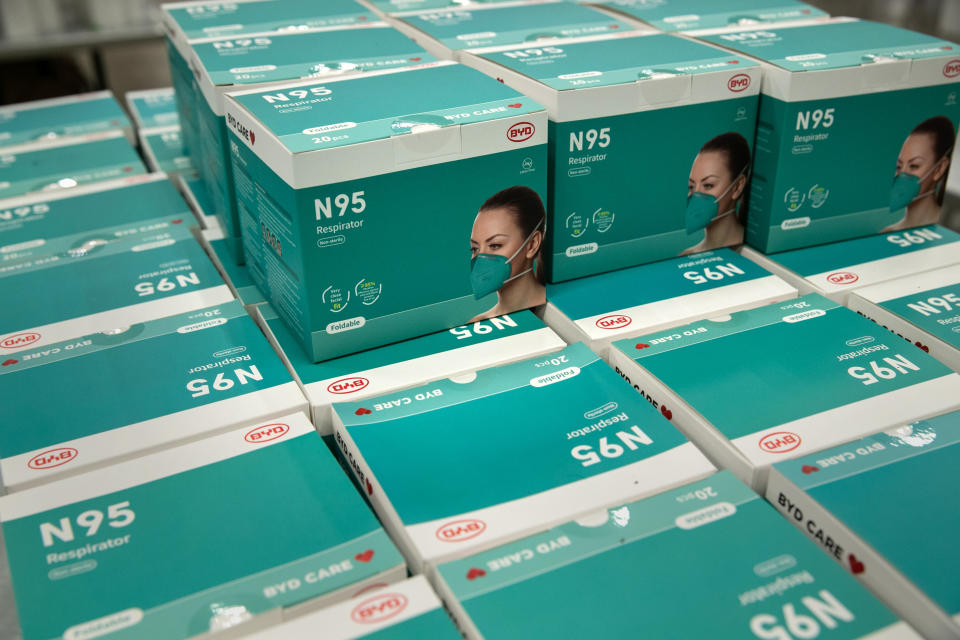White House dismisses criticism of persistent coronavirus supply chain problems as work of 'useful idiot'
WASHINGTON — The White House is objecting to a new report from the Government Accountability Office that concludes that seven months into the coronavirus pandemic, the U.S. continues to struggle with supply chain logistics that have led to shortages of personal protective equipment and diagnostic tests.
The authors of the nearly 400-page GAO report were concerned that not only did those issues continue to persist, but that the Trump administration did not take them seriously enough. “As supply constraints continue,” those investigators wrote, “we found that [the Department of Health and Human Services] and [the Federal Emergency Management Administration] have not developed plans outlining specific actions the federal government will take to help mitigate remaining medical supply gaps needed to respond to the pandemic.”
Those challenges could soon be joined, and supplanted, by an even greater one: that of delivering a coronavirus vaccine to millions of people. The report warned that “without clearly defined roles and responsibilities, the federal response structure may be unable to respond to new supply chain challenges that could emerge.”
The report called for a “national plan” for vaccine distribution. No such plan exists. The lack of such a plan for diagnostic tests through the spring and summer led to competition, replication and confusion.

The White House, however, painted the agency’s findings as an attack on the administration. “It is well-known that the GAO is neither non-partisan or independent but simply a useful idiot for the Democrat Party and Big Labor,” White House economic adviser Peter Navarro told Yahoo News in a response forwarded by the White House communications department. “Its bureaucrats lean heavily left and contribute equally heavily to Democrat candidates. In this election season, this new ‘report’ is without merit and simply an in-kind contribution to the Biden campaign.”
GAO is an independent agency that reports to Congress, producing frequent reports on a wide range of government activities.
In response to the White House criticism, the GAO defended its report and conclusions. “For nearly a century GAO has been a source of non-partisan, fact based work for both sides of the aisle in Congress. We do work specifically at the request of both Congressional Chairs of Committees and the Ranking Members, and both turn to our subject matter experts when they are looking for facts," Chuck Young, the GAO’s managing director of public affairs, wrote in an email to Yahoo News. “The CARES Act was no exception, since it was passed with a high level of bipartisan support, and with mandates for GAO to look at how the law was being implemented. Also in this report, the agencies we looked at all got a chance to comment on our recommendations and in many cases, agreed with them. We followed the facts in this report, as we do in all our work, and we will continue to take that approach.”
Democrats had the precise opposite response of the White House’s to the GAO report. “There is no national strategy,” said economic adviser Andy Kim, D-N.J., who sits in a House of Representatives coronavirus subcommittee that has closely scrutinized the president’s response. “To me that’s terrifying.”
Kim worried that the delivery of a vaccine would only exacerbate the logistical disorganization that has plagued the nation in the spring, as both individuals and institutions struggled to find face masks, diagnostic tests and other equipment.
“This report is exactly what I didn't want to see today,” Kim told Yahoo News on Monday evening, explaining that it confirmed his “deep concerns that we are not ready” for a tough winter season that could see a challenging combination of influenza and coronavirus cases. At the same time, the distribution of the very first doses of a coronavirus vaccine to vulnerable populations could come within months.
In its response to the report, HHS — which has been mired in political turf battles — praised its own efforts as “remarkably successful.”

That response then went on to dispute the shortfalls outlined by the GAO by blaming, in part, Democratic governors in states such as New York and New Jersey for the scope of the pandemic. Shifting the blame to “blue states” has been a favorite tactic of President Trump. Sarah Arbes, a former staffer for Senate Majority Leader Mitch McConnell, who now heads legislative efforts at the health department, wrote the combative HHS response.
Later, a spokesperson for HHS said that it was “important to keep in mind the federal government’s role in emergency response is the short-term augmentation of state and local resources. In addition, HHS has poured billions of dollars into state and local readiness, including for healthcare system preparedness such as preparing for a surge in the demand for medical care. The U.S. healthcare system is largely a private industry and relies on private sector supply contracts, often with just-in-time supply models.”
The spokesperson added that “‘shortages’ are subjective and depend upon several factors.”
In its own response to the GAO report, the Department of Homeland Security, which oversees the FEMA, rejected the notion that a new national plan was necessary.
In sum, the GAO found that the “federal government has continued to take steps to put supplies in the hands of those who need them. However, the availability of certain types of personal protective equipment (PPE) remains constrained and testing supply shortages persist due to a supply chain overwhelmed by the demands of the global pandemic and certain supplies not being produced domestically.”
As early as March, President Trump claimed that any American who wants a coronavirus test is able to receive one, which was untrue at that time. It is much easier to get a test today, but days-long waits for results make the results of those tests less than useful. Trump has also made similar claims about the availability of hospital ventilators and personal protective equipment.
“This GAO report is more evidence of President Trump’s failure to solve the massive supply chain issues facing the nation as a result of the COVID-19 pandemic,” Sen. Elizabeth Warren told Yahoo News. She called for the Trump administration to “meaningfully use” its powers to stock supplies and urged the passage of a bill she and Sen. Marco Rubio have co-sponsored that would consider returning pharmaceutical production to the United States. Most pharmaceuticals and medical equipment are now made abroad, in countries such as India and China.

Officials in seven of eight states surveyed by the report’s authors “identified previous or ongoing shortages of testing supplies, including swabs, reagents, tubes, pipettes, and transport media.” One state, for example, “was unable to fulfill local entities’ requests for N95 respirators and nitrile gloves.” In two other states, officials worried to GAO investigators about “the impact of a fall surge on supply availability.”
In its response, HHS disputed that it lacked a national plan for distribution of pandemic-related materials. “Unfortunately, your report and recommendations prioritize anonymous anecdotes about minor and temporary coordination issues,” the department told GAO.
The desire to respond to the pandemic quickly has resulted in a haphazard response lacking in oversight, the report found, highlighting areas other than supply chain logistics in which the Trump administration has fallen short. About $12 billion disbursed in government contracts as of July 31 — comprising half the value of all government contracts — was awarded without any competitive bidding, which can pose the risk of fraud or overcharging.
The government is also failing to collect race and ethnicity data on people stricken by the coronavirus. That could complicate efforts to properly target vaccines, therapeutics and other relief efforts. The new GAO report found that, as of the end of July, 64 percent of coronavirus cases came with no ethnic or racial data attached. (A new reporting requirement that went into effect on Aug. 1 should significantly lower than number, though only if laboratories follow that guidance.)
And the administration’s push to reopen schools for in-person instruction, the report said, was “misaligned” with guidelines from the Centers for Disease Control and Prevention and does “not appear to align with a risk-based decision-making approach.”
Disparate as these shortfalls may seem, they have combined to create a consistently confusing response to a pandemic that has killed 200,000 people in the U.S. Rep. Jim Clyburn, D-S.C., who heads the House coronavirus subcommittee, said he hoped the report’s sobering conclusions would lead Trump to “finally show some leadership to protect Americans’ lives.”
Trump’s reaction has been to minimize the scope of the pandemic, which has also caused millions of people to lose jobs.
“It affects virtually nobody,” Trump said at a political rally on Monday evening.
_____
Read more from Yahoo News:

 Yahoo Sport
Yahoo Sport 








































